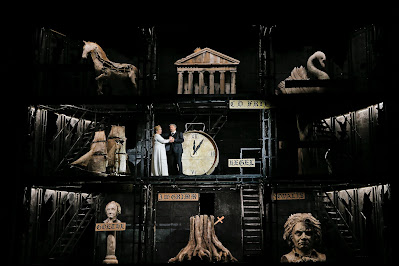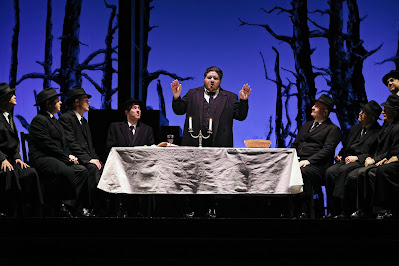The 6th Annual OperaChaser Awards
The 6th OperaChaser Awards, as in previous years, are an opportunity to reflect on the year and are dedicated to all those who have contributed in sharing their artistic and creative pursuits in nourishing their audiences with immeasurable meaning and lasting enjoyment.
Nothing seems left unaffected in our lives and behaviours after a pandemic-havoc-causing couple of years. My own former life of constant international travel for several decades is now no longer. I can only reflect on the fortune of that, as well as on the incredible smorgasbord of world opera seen in that period.
Still, I count my blessings for this year’s return to travelling internationally — be it in a much reduced capacity — and seeing two new Ring productions, one in Bayreuth and the other in Berlin. I also saw a production of Die Fledermaus, performed by international students of the Berlin Opera Academy — those who know my opera-going habits will be aware of my great pleasure in seeing young developing artists making their mark at the beginning of potential life-long careers.
Interstate travel similarly took a dive outside my hometown of Melbourne as well this year. A visit to Adelaide in March for the Adelaide Festival’s Watershed: The Death of Dr Duncan, composed by Joseph Twist with libretto by Alana Valentine and Christos Tsiolkas, and The Golden Cockerel, directed by Barrie Kosky, was followed by just three trips to Sydney.
First up in Sydney was Opera Australia’s Otello by Verdi and a new production of La Juive in its national premiere in March. The final two trips were made for each of baroque specialists Pinchgut Opera’s Orontea in May and Médée in December. All were well worth the journey.
Consequently, it was decided to concentrate this year’s OperaChaser Awards on those opera productions and operas in concert seen locally only in Melbourne. The art form hasn’t yet bounced back with the breadth and frequency of pre-pandemic days — and that was a state that could have been much improved upon — but what is truly alive is how our independent and grassroots opera communities are itching to convey their art and put on a show. Thank you to Melbourne Opera, IOpera, Australian Contemporary Opera Company, BK Opera and Lyric Opera Melbourne, and to government funded companies Opera Australia and Victorian Opera.
The national and state opera companies, however, need to lead the way with greater commitment to our city and regional areas, including making greater inroads to educating and enticing young audiences.
Also, for the first time, I’m glad to finally recognise and single out the impressive work of a young individual building their career with the OperaChaser Award for Young Developing Artist.
As always, thank you to all involved in creating the ephemeral beauty of opera in performance. Again, there is neither a flash ceremony nor a trophy to go with it but I sincerely hope that these awards bring a little pleasure to the deserved artists who bring excellence to the art of opera and all who continue to dig deep into their artistic, dramatic and creative energies.
I am pleased to announce the winners of the 6th OperaChaser Awards, 2022.
 |
| OperaChaser Award for Outstanding Production, Melbourne: Lohengrin, Opera Australia Photo:Jeff Busby |
Outstanding Opera in Concert
Siegfreid, Melbourne Opera
Outstanding Director
Suzanne Chaundy
Die Walküre, Melbourne Opera
Outstanding Male in a Leading Role
Jonas Kaufmann
Title role, Lohengrin Opera Australia
Outstanding Female in a Leading Role
Stacey Alleaume
Violetta, La Traviata, Opera Australia
Simon Meadows
Friedrich of Telramund, Lohengrin, Opera Australia
Outstanding Female in a Supporting Role
Akansha Hungenahally
Young Fan, Belle and Martha Cratchit, A Christmas Carol, Victorian Opera
Outstanding Chorus
Victorian Opera Emerging Artists and Children's Chorus
Il Mago di Oz, Victorian Opera
Outstanding Set Design
Andrew Bailey
Die Walküre, Melbourne Opera
Outstanding Costume Design
Bryanna Lowen
Iphis, Lyric Opera Melbourne
Outstanding Lighting Design
Rob Sowinski
Die Walküre, Melbourne Opera


